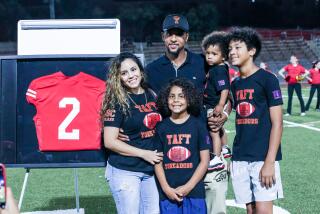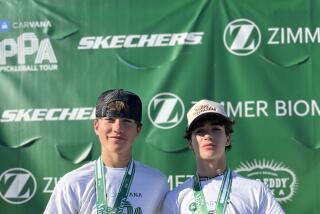When it comes to basketball, it’s a clear case of like father, like son
- Share via
To see Dane Suttle and Dwayne Polee playing on the same high school basketball team three decades after their fathers became high school legends in South Central Los Angeles is a real back-to-the-future moment.
Even the fathers, who share their names with their sons, are a little stunned at how life has come full circle.
“It’s going to be weird,” the elder Suttle said. “It’s almost like watching me and Dwayne playing again.”
Added the elder Polee: “It’s like deja vu.”
Dane Elvin Suttle is the reigning City Section player of the year starting his senior season at Westchester. We’ll call him Suttle II. Dwayne Polee II is a freshman at Westchester with so much talent and potential that USC Coach Tim Floyd offered him a scholarship last month and he accepted, even though he won’t graduate until 2010.
Basketball practice officially began Monday for City teams, and these fathers are eagerly counting the days before the Comets’ season opener Dec. 6.
“I know I’m not going to sit by Dane because he’s a little intense,” Polee said.
Those who followed high school basketball in Southern California in the late 1970s and early 1980s know there were few players better than Suttle and Polee.
Suttle, a 6-foot-3 guard, was a two-time All-City guard at Los Angeles Fremont in 1978 and 1979 before moving on to Pepperdine, where he became the school’s all-time scoring leader with 1,702 points.
Polee, a 6-5 swingman, was the 1981 City player of the year at Los Angeles Manual Arts. He turned in perhaps the greatest individual performance in City championship game history when he scored 43 points in Manual Arts’ 82-69 victory over Crenshaw at the Sports Arena in front of 14,123, the largest crowd in City history.
“That’s the only thing they remember me by,” Polee said. “They don’t remember if I was a good person or not, but they remember that game.”
After playing one season at Nevada Las Vegas, Polee transferred to Pepperdine, where he was a two-time West Coast Conference player of the year.
“Polee was a ninth-grade phenom just like his son now,” said former Pepperdine coach Jim Harrick, who recruited Suttle and Polee. “Everybody was talking about him. He was long, athletic, could run and dunk and was the next coming of the next great player. Dane Suttle never found a shot he didn’t like. He was born to score.”
The fathers never played together at Pepperdine, missing each other by a year, but they played against each other three times during the 1978-79 high school season, when Polee was a sophomore at Manual Arts. His team won both league games.
Neither made it big in the NBA. Suttle was a seventh-round draft choice of the Kansas City Kings and played for two seasons. Polee was a third-round pick of the Clippers and played in only one game. Their experiences -- the successes and the failures -- are being passed on to their sons.
“I talk to Dane all the time that basketball only lasts so long,” Suttle said. “It doesn’t matter how much money you make in sports. This stuff comes and goes, life moves on.
“That’s why I don’t make it so important at home that he has to be so great that his only aspirations are just the NBA because if I did that, I would lose being a father.”
Said Polee: “I really don’t want him to go that far yet. I want him to enjoy the high school situation. He’s in ninth grade. I want him to grow as a student-athlete. Everything else will work out. He’s a great kid and I’ve told him great things will happen if you work hard.”
Polee II, a 6-5 14-year-old with long arms, terrific jumping ability and a natural instinct for the game, has had to deal with increased expectations because he shares his father’s name. But that doesn’t bother him.
“It makes me feel proud,” he said. “I work hard to make my own path.”
Said his father: “I don’t want a lot of pressure on him being Dwayne Polee, but he has to take on that burden. You can’t change his name.”
Suttle II, a 6-5 17-year-old who has earned the reputation as one of the best shooters in the City Section, understands that he must keep improving to fulfill expectations.
“This year, I have to try to do more stuff,” he said. “A lot of people think I just can shoot. I can do a lot more, like off the dribble, driving and playing defense.”
The fathers, full of pride, don’t play against their sons in games of one on one anymore.
“I quit about a year ago,” Suttle, 44, said. “My knees couldn’t hold up.”
Polee, 42, said he doesn’t go against his son because “he’s not going to embarrass me.”
But ask the fathers if they could beat their boys if they teamed up for a game of two on two, and their old high school cockiness comes back.
“We’d kill them, no doubt about it,” Polee said. “Old school.”
Suttle II counters: “Oh, no. They won’t kill us.”
As for what would happen if the fathers faced each other, spectators would need to bring sleeping bags because the one-on-one game would go on endlessly.
“All we’re going to do is fight,” Polee said. “The game will last forever. He’s going to call the wrong calls.”
Said Suttle: “Dwayne is a great defensive player and likes to put his hand on you, and I don’t allow it. Every time he touches me, I’m going to call it.”
So much has changed for the fathers. They remember days when there were no video games, no cable television, no Internet, no shoe wars.
“They’re spoiled,” Polee said of today’s high school players. “The only thing we had was to go outside and play basketball all day. They’re not teaching kids how to play basketball. It’s about who’s on your team and the company you’re wearing shoes for.”
Added Suttle: “It isn’t as easy as perceived. I know how hard it is to go to college, maintain your academics, stay out of trouble and produce as a basketball player.”
Suttle works as a private coach. Polee works for a non-profit organization, tutoring and mentoring kids.
“When you’re a kid from the inner city, you can get into a lot of things,” Polee said. “Every kid needs some kind of mentor in his life. That’s important to me. That’s why I deal with young kids.”
The boys don’t really seem to understand how successful their fathers were in high school.
“I don’t really know about their history,” Suttle II said.
Added Polee II: “I heard he dropped 43 points.”
The fathers aren’t interested in turning the clock back. They seem content to pass on their love of basketball to their sons.
“It’s about them,” Polee said.
Added Suttle: “We were friends way before we had our sons. Now they get to compete against other people. I’m just blessed to be here.”
Eric Sondheimer can be reached at eric.sondheimer@latimes.com
More to Read
Get our high school sports newsletter
Prep Rally is devoted to the SoCal high school sports experience, bringing you scores, stories and a behind-the-scenes look at what makes prep sports so popular.
You may occasionally receive promotional content from the Los Angeles Times.







